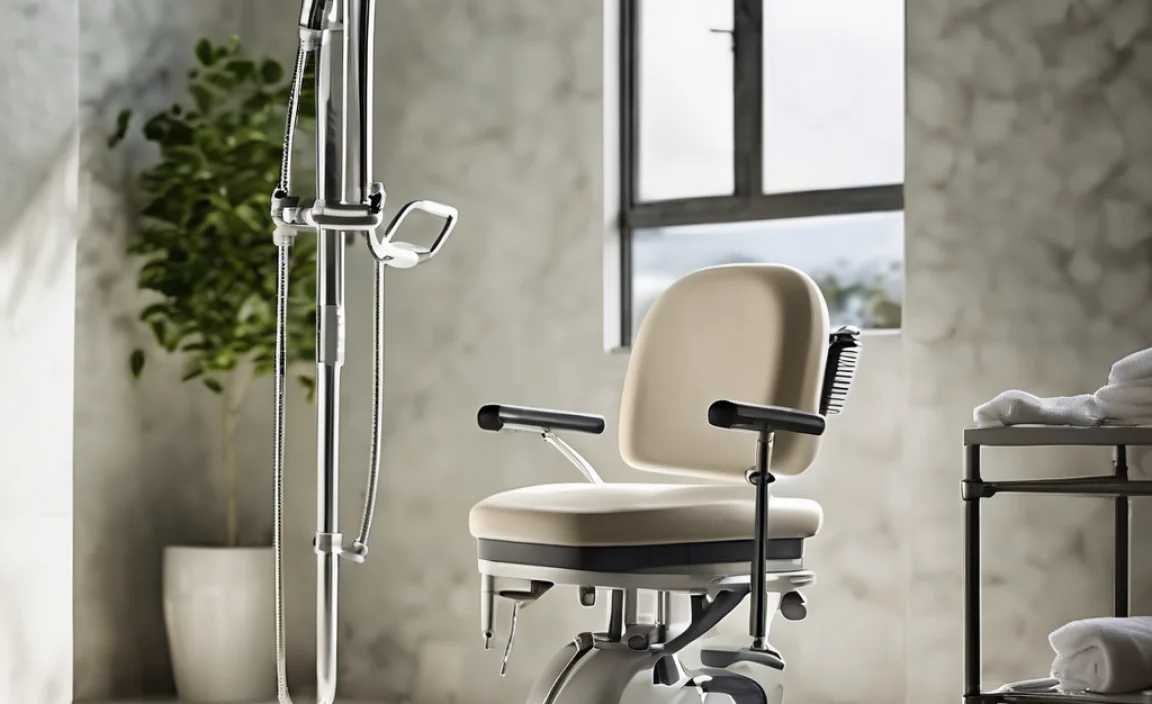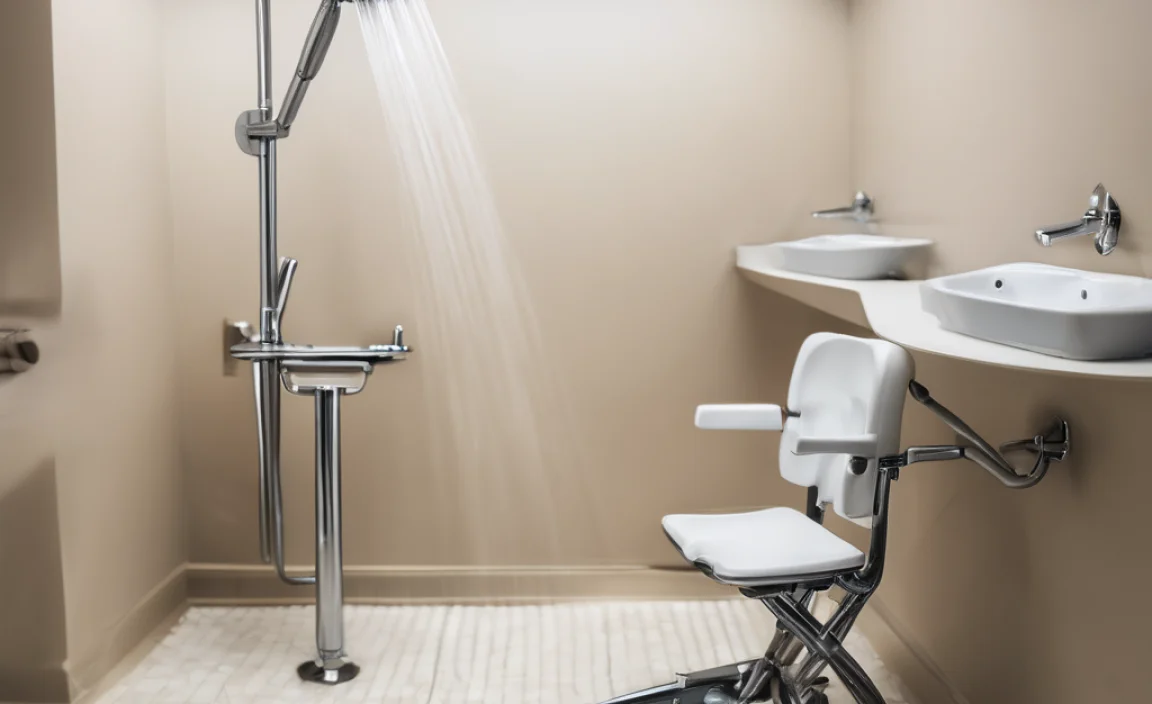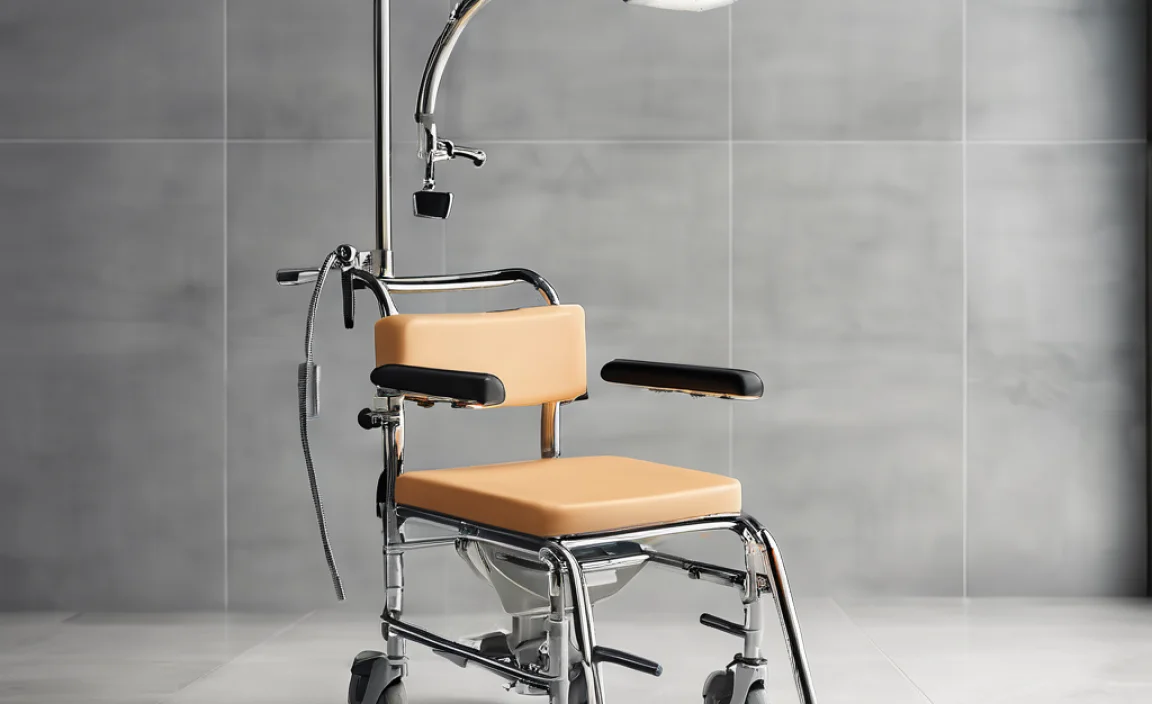Will Medicare pay for a shower chair? Generally, yes, Medicare Part B may cover a shower chair if it’s deemed medically necessary by your doctor. This means your doctor needs to prescribe it, and you must obtain the chair from a Medicare-approved supplier. Coverage often falls under Durable Medical Equipment (DME).
Figuring out if Medicare covers a shower chair can be confusing. You’re not alone if you’re unsure where to start! Many folks find it tough to navigate the rules and paperwork. A shower chair can make a huge difference in safety and comfort, so it’s important to get this sorted out.
This guide will walk you through everything step by step. We’ll cover what Medicare Part B includes, how to get a prescription, and where to find approved suppliers. By the end, you’ll know exactly how to get Medicare to pay for your shower chair, making your bathroom safer and more accessible.
Understanding Medicare and Durable Medical Equipment (DME)

Let’s break down how Medicare works with Durable Medical Equipment, like shower chairs. Knowing the basics will help you understand what’s covered and how to get it.
What is Medicare?
Medicare is the federal health insurance program for people 65 or older, certain younger people with disabilities, and people with End-Stage Renal Disease (ESRD). It helps cover the cost of healthcare, but it doesn’t cover everything. There are different parts of Medicare, each covering different services:
- Part A (Hospital Insurance): Covers inpatient hospital stays, care in a skilled nursing facility, hospice care, and some home health care.
- Part B (Medical Insurance): Covers certain doctors’ services, outpatient care, medical supplies, and preventive services.
- Part C (Medicare Advantage): An alternative to Original Medicare (Parts A and B), offered by private companies approved by Medicare.
- Part D (Prescription Drug Insurance): Helps cover the cost of prescription drugs.
What is Durable Medical Equipment (DME)?
Durable Medical Equipment (DME) is equipment that:
- Is primarily used to serve a medical purpose
- Is durable (can withstand repeated use)
- Isn’t usually useful to someone who isn’t sick or injured
- Is used in your home
- Has an expected lifetime of at least three years
Common examples of DME include:
- Wheelchairs
- Walkers
- Hospital beds
- Oxygen equipment
- Blood sugar monitors
- Shower chairs
Medicare Part B and DME Coverage
Medicare Part B is the part of Medicare that covers Durable Medical Equipment. If your doctor prescribes a shower chair and deems it medically necessary, Medicare Part B may cover 80% of the approved cost. You are responsible for the remaining 20% (coinsurance) and any unmet deductible.
To get DME covered under Medicare Part B, you need to:
- Have a doctor prescribe the equipment.
- Get the equipment from a Medicare-approved supplier.
Keep in mind that Medicare has specific rules about what kind of equipment they cover and from whom you can get it. Make sure to follow these rules to avoid claim denials.
Is a Shower Chair Considered Durable Medical Equipment?

Yes, a shower chair is generally considered Durable Medical Equipment (DME) by Medicare. But there are specific conditions that must be met for it to be covered.
Why a Shower Chair Qualifies as DME
A shower chair meets the criteria for DME because it:
- Serves a medical purpose by providing a safe seating option for individuals with mobility issues or medical conditions.
- Is durable and designed for repeated use.
- Is not typically useful to someone without a medical need.
- Is used in the home to assist with daily living activities.
Conditions for Medicare Coverage
Even though a shower chair is DME, Medicare won’t automatically cover it. Here are the key conditions:
- Medical Necessity: Your doctor must determine that a shower chair is medically necessary for you. This means you have a condition that makes it difficult or unsafe to stand in the shower.
- Prescription: You need a written prescription from your doctor for the shower chair.
- Medicare-Approved Supplier: You must purchase or rent the shower chair from a supplier that is approved by Medicare.
Types of Shower Chairs Covered
Medicare typically covers standard shower chairs. These are simple chairs or stools designed for use in the shower. More advanced or deluxe models may not be fully covered. Here are a few common types:
- Shower Stools: Simple, backless seats.
- Shower Chairs with Backs: Provide additional support.
- Shower Chairs with Arms: Offer extra stability for getting in and out of the chair.
- Transfer Benches: Extend over the side of the tub to help individuals slide into the shower.
It’s a good idea to check with your supplier and Medicare to confirm that the specific type of shower chair you need is covered before making a purchase.
How to Get Medicare to Pay for a Shower Chair: A Step-by-Step Guide

Getting Medicare to cover your shower chair involves a few key steps. Follow this guide to make sure you meet all the requirements.
Step 1: Consult Your Doctor
The first and most important step is to talk to your doctor. Explain why you need a shower chair and how it will help you. Be specific about your medical condition and how it affects your ability to shower safely. Your doctor needs to determine that a shower chair is medically necessary for you.
What to Discuss with Your Doctor:
- Your specific medical condition
- How the condition impacts your ability to shower
- The type of shower chair that would best meet your needs
Step 2: Get a Prescription
If your doctor agrees that a shower chair is medically necessary, they will write you a prescription. This prescription is crucial for Medicare coverage. Make sure the prescription includes:
- Your name and date of birth
- The specific type of shower chair needed
- The medical reason for the chair
- Your doctor’s signature and date
Keep a copy of the prescription for your records.
Step 3: Find a Medicare-Approved Supplier
You must get your shower chair from a supplier that is approved by Medicare. Not all medical supply stores are Medicare-approved. To find an approved supplier, you can:
- Ask your doctor for a recommendation.
- Use the Medicare.gov website to search for suppliers in your area.
- Call 1-800-MEDICARE and ask for a list of DME suppliers.
When choosing a supplier, consider:
- Their reputation and customer reviews.
- The variety of shower chairs they offer.
- Their pricing and billing practices.
- Their return policy.
Step 4: Purchase or Rent the Shower Chair
Once you’ve found a Medicare-approved supplier, you can purchase or rent the shower chair. In some cases, Medicare may prefer you rent the equipment, especially if it’s needed for a short period. Discuss the options with your supplier.
Important Considerations:
- Make sure the supplier bills Medicare directly.
- Understand your financial responsibility (the 20% coinsurance and any unmet deductible).
- Get a receipt and keep it for your records.
Step 5: Follow Up
After you receive your shower chair, follow up with your doctor to ensure it meets your needs. If you have any issues with the equipment, contact your supplier right away.
Potential Issues:
- The chair is the wrong size or type.
- The chair is uncomfortable or doesn’t provide enough support.
- The chair is defective or broken.
By following these steps, you can increase your chances of getting Medicare to pay for your shower chair and improve your safety and comfort in the bathroom.
Choosing the Right Shower Chair
Selecting the right shower chair is crucial for your safety and comfort. There are various types and features to consider. Here’s a guide to help you make the best choice.
Types of Shower Chairs
There are several types of shower chairs, each designed to meet different needs:
- Shower Stools: Simple, backless seats that are lightweight and easy to move. Best for individuals who need minimal support.
- Shower Chairs with Backs: Provide additional support for the back, making them suitable for those who need more stability.
- Shower Chairs with Arms: Offer extra support and stability for getting in and out of the chair. Ideal for individuals with limited upper body strength.
- Transfer Benches: Extend over the side of the tub, allowing individuals to sit and slide into the shower. Great for those with significant mobility issues.
- Folding Shower Chairs: Can be folded for easy storage, making them a good option for small bathrooms.
Key Features to Consider
When choosing a shower chair, think about these features:
- Weight Capacity: Make sure the chair can safely support your weight.
- Seat Height: Adjustable height is important for comfort and ease of use.
- Seat Material: Look for non-slip, easy-to-clean materials.
- Armrests and Backrests: Consider whether you need these for additional support.
- Footrests: Some chairs come with footrests for added comfort.
- Portability: If you plan to travel with the chair, choose a lightweight, foldable model.
Safety Tips for Using a Shower Chair
Using a shower chair safely is essential to prevent accidents. Here are some tips:
- Proper Placement: Position the chair securely in the shower or tub.
- Non-Slip Surface: Ensure the chair has non-slip feet to prevent sliding.
- Check Stability: Before each use, check that the chair is stable and secure.
- Use Grab Bars: Install grab bars in the shower for additional support.
- Avoid Overreaching: Keep everything you need within easy reach to avoid overextending.
- Dry Thoroughly: Dry the chair and the surrounding area after each use to prevent slips.
Table: Comparing Shower Chair Types
| Type | Pros | Cons | Best For |
|---|---|---|---|
| Shower Stool | Lightweight, easy to move, affordable | Minimal support | Individuals needing minimal assistance |
| Shower Chair with Back | Good back support, stable | Slightly less portable | Individuals needing moderate support |
| Shower Chair with Arms | Extra stability, helps with sitting and standing | Can be bulky | Individuals with limited upper body strength |
| Transfer Bench | Easy transfer from outside the tub | Takes up more space | Individuals with significant mobility issues |
| Folding Shower Chair | Easy to store, portable | May be less sturdy | Small bathrooms, travel |
By carefully considering your needs and the features of different shower chairs, you can find the perfect one to enhance your safety and comfort in the bathroom.
Navigating Medicare Advantage Plans
If you have a Medicare Advantage plan (Part C), the process for getting a shower chair covered might be a bit different than with Original Medicare (Parts A and B). Here’s what you need to know.
Understanding Medicare Advantage
Medicare Advantage plans are offered by private companies that contract with Medicare to provide all your Part A and Part B benefits. Many Medicare Advantage plans also include Part D (prescription drug coverage). These plans often have different rules, costs, and coverage options than Original Medicare.
Coverage Differences
Medicare Advantage plans must cover everything that Original Medicare covers, but they can also offer additional benefits, such as vision, dental, and hearing care. However, they may have different rules for getting Durable Medical Equipment (DME) like shower chairs.
Key Differences to Consider:
- Prior Authorization: Some Medicare Advantage plans require prior authorization before you can get DME. This means your doctor needs to get approval from the plan before prescribing the equipment.
- In-Network Suppliers: Medicare Advantage plans often have a network of preferred suppliers. You may need to get your shower chair from a supplier within the plan’s network to get coverage.
- Cost-Sharing: Your cost-sharing amounts (deductibles, copays, and coinsurance) may be different with a Medicare Advantage plan than with Original Medicare.
Steps to Get a Shower Chair with Medicare Advantage
Here’s a step-by-step guide to getting a shower chair covered under your Medicare Advantage plan:
- Check Your Plan’s Rules: Review your plan’s Summary of Benefits or contact the plan directly to understand their specific rules for DME coverage.
- Consult Your Doctor: Talk to your doctor about your need for a shower chair and get a prescription.
- Get Prior Authorization (If Required): If your plan requires prior authorization, your doctor will need to submit a request to the plan.
- Find an In-Network Supplier: Use your plan’s provider directory to find a Medicare-approved DME supplier within the network.
- Purchase or Rent the Shower Chair: Get the shower chair from the in-network supplier and make sure they bill your Medicare Advantage plan directly.
- Follow Up: Ensure the shower chair meets your needs and address any issues with your supplier or plan.
Table: Medicare Advantage vs. Original Medicare for Shower Chair Coverage
| Feature | Original Medicare | Medicare Advantage |
|---|---|---|
| Coverage for DME | Part B covers 80% of approved cost | Must cover at least what Original Medicare covers, but may have different rules |
| Prior Authorization | Typically not required | May be required |
| Supplier Network | Any Medicare-approved supplier | May need to use in-network suppliers |
| Cost-Sharing | 20% coinsurance after deductible | Varies by plan (deductibles, copays, coinsurance) |
Tips for Navigating Medicare Advantage
- Keep Detailed Records: Keep copies of all prescriptions, authorizations, and receipts.
- Contact Your Plan: If you have questions or concerns, contact your Medicare Advantage plan directly.
- Understand Your Rights: Know your rights as a Medicare beneficiary, including your right to appeal coverage decisions.
By understanding the specific rules and requirements of your Medicare Advantage plan, you can successfully navigate the process of getting a shower chair covered and ensure you have the equipment you need for safe and comfortable bathing.
Alternative Funding Options for Shower Chairs
If Medicare doesn’t fully cover the cost of a shower chair, or if you don’t qualify for Medicare, there are other options to explore. Here are some alternative funding sources and programs that can help.
Medicaid
Medicaid is a joint federal and state program that provides healthcare coverage to low-income individuals and families. Medicaid may cover the cost of a shower chair if it’s deemed medically necessary. Eligibility requirements and coverage details vary by state, so you’ll need to check with your local Medicaid office for specific information.
How to Apply for Medicaid:
- Contact your state’s Medicaid agency.
- Complete an application.
- Provide documentation of your income and assets.
- Obtain a doctor’s prescription for the shower chair.
Veterans Affairs (VA) Benefits
If you’re a veteran, you may be eligible for healthcare benefits through the Department of Veterans Affairs (VA). The VA may cover the cost of a shower chair if it’s determined to be medically necessary for your care. Contact your local VA medical center to learn more about eligibility and coverage.
How to Access VA Benefits:
- Enroll in VA healthcare.
- Consult with your VA doctor about your need for a shower chair.
- Obtain a prescription or recommendation from your VA doctor.
- Work with the VA to obtain the equipment.
Nonprofit Organizations
Several nonprofit organizations offer financial assistance or equipment to individuals with disabilities or medical needs. These organizations may be able to help with the cost of a shower chair.
Examples of Nonprofit Organizations:
- The ALS Association: Provides support and resources for individuals with ALS (Lou Gehrig’s disease), including assistance with medical equipment.
- The Muscular Dystrophy Association (MDA): Offers services and support for individuals with muscular dystrophy and related diseases.
- United Way: Connects individuals with local resources and programs, including assistance with healthcare needs.
Local Charities and Community Programs
Check with local charities and community programs in your area. These organizations may offer assistance with medical equipment or connect you with resources that can help.
Examples of Local Resources:
- Area Agencies on Aging (AAA): Provide services and support for older adults, including assistance with healthcare needs.
- Local Churches and Religious Organizations: May offer financial assistance or connect you with resources.
- Community Centers: Often have information about local programs and services.
Equipment Loan Programs
Some organizations offer equipment loan programs, where you can borrow a shower chair or other medical equipment for a period of time. This can be a good option if you only need the equipment temporarily.
How Equipment Loan Programs Work:
- Contact local disability organizations or senior centers.
- Inquire about their equipment loan programs.
- Complete an application and provide any required documentation.
- Borrow the equipment for the specified period.
Table: Alternative Funding Options for Shower Chairs
| Option | Eligibility | How to Access |
|---|---|---|
| Medicaid | Low-income individuals and families | Contact your state’s Medicaid agency |
| VA Benefits | Veterans | Enroll in VA healthcare and consult with your VA doctor |
| Nonprofit Organizations | Individuals with specific medical conditions or disabilities | Contact organizations like ALS Association or MDA |
| Local Charities and Community Programs | Varies by program | Check with Area Agencies on Aging, local churches, and community centers |
| Equipment Loan Programs | Varies by program | Contact local disability organizations or senior centers |
By exploring these alternative funding options, you can find resources to help cover the cost of a shower chair and improve your safety and comfort in the bathroom.
FAQ: Will Medicare Pay for a Shower Chair?
Here are some frequently asked questions about Medicare coverage for shower chairs, to help clear up any confusion.
Q1: Does Medicare Part A cover shower chairs?
No, Medicare Part A (Hospital Insurance) generally does not cover shower chairs. Part A primarily covers inpatient hospital stays, skilled nursing facility care, hospice care, and some home health care.
Q2: Will Medicare Part B pay for a shower chair?
Yes, Medicare Part B (Medical Insurance) may cover a shower chair if it is deemed medically necessary by your doctor. You need a prescription, and you must obtain the chair from a Medicare-approved supplier.
Q3: What does “medically necessary” mean for a shower chair?
Medically necessary means that your doctor has determined that you need a shower chair to safely perform daily activities due to a medical condition, such as mobility issues or balance problems.
Q4: Do I need a prescription for a shower chair to get Medicare coverage?
Yes, you need a written prescription from your doctor for the shower chair to be eligible for Medicare coverage.
Q5: Can I buy a shower chair from any store and get reimbursed by Medicare?
No, you must purchase the shower chair from a Medicare-approved supplier to get coverage. Medicare will not reimburse you if you buy the chair from a non-approved store.
Q6: What if my Medicare Advantage plan denies coverage for a shower chair?
If your Medicare Advantage plan denies coverage, you have the right to appeal the decision. Follow the plan’s appeal process, and be sure to provide any additional documentation that supports your need for the shower chair.
Q7: How much will I have to pay out of pocket for a shower chair with Medicare Part B?
If Medicare Part B covers the shower chair, they will typically pay 80% of the approved cost. You are responsible for the remaining 20% (coinsurance) and any unmet deductible.
Conclusion
Navigating Medicare coverage for a shower chair might seem tricky at first, but it’s definitely manageable. The key is to understand the requirements, follow the steps, and gather the necessary documentation. By consulting with your doctor, getting a prescription, and using a Medicare-approved supplier, you can increase your chances of getting Medicare to cover the cost.
Remember, your safety and comfort in the bathroom are important. If Medicare doesn’t fully cover the cost, explore alternative funding options like Medicaid, VA benefits, or nonprofit organizations. Don’t hesitate to reach out to local charities and community programs for additional support.
With a little bit of effort and the right information, you can find a shower chair that meets your needs and makes your daily routine safer and more comfortable. Take it one step at a time, and you’ll be enjoying a safer shower in no time!

